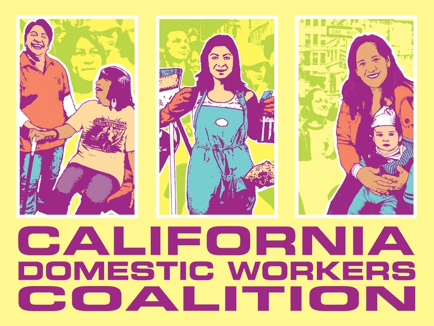Domestic workers such as home attendants, nannies, and housecleaners secure another victory in the State Senate. The Health and Safety For All Workers Act, authored by María Elena Durazo (D-Senate District 24) and sponsored by the California Domestic Workers Coalition, passed the Senate Judiciary Committee yesterday afternoon. SB 321 would end the exclusion of domestic workers from the Division of Occupational Safety and Health (Cal/OSHA) protections. The allotted 15 minutes of public comment was filled with domestic workers, employers, and allies calling in from across California to express their support for the bill. No opposition was presented in the hearing. The Senate Judiciary Committee voted in favor of the bill.
Nikki Brown-Booker, a domestic employer and leader of Hand in Hand: The Domestic Employer Network, shared her testimony on how the law would benefit employers with disabilities. “I need this guidance to ensure my own safety. As a person who needs my attendant to pick me up, for example, ensuring that my attendant has access to information and training about the safest way to do so is integral to my own safety,” said Brown-Booker. “Our health and safety is interconnected. If they fall or hurt themselves due to a lack of protocols, my own safety would be at stake.”
Deysi Lopez, a domestic worker and leader of ALMAS at the Graton Day Labor Center also shared her testimony at the hearing as a witness speaker. “As we speak, many domestic workers are on their way to work without Cal/OSHA protections, and there are no standards,” said Lopez. “It is urgent that SB321 is passed because as immigrant women and women of color, every day we continue to be unfairly exposed to workplaces that endanger our health and safety.”
In anticipation of the Senate Judiciary Committee hearing, domestic workers, employers, and allies organized visits with members of the committee, led a Call-in Day, and conducted a Twitterstorm with the hashtags #SB321 #MyHealthMyDignity and #HealthandSafetyNow to show their support for the bill. Actions included the circulation of videos expressing why it is important to have health and safety protections for domestic workers at the workplace. In her video, María Hernández, a domestic worker leader from CHIRLA, states, “Domestic workers need health and safety protections because we are essential workers, but we aren’t supported. We need permanent protections.”
“The Senate Judiciary’s vote today on SB 321 is a major step forward toward securing the basic protections that domestic workers deserve. There are more than 300,000 domestic workers in California, and more than 2 million households depend on their labor to care for their homes, children, seniors, and for Californians with disabilities.” said Senator María Elena Durazo (D-Los Angeles), the bill’s author. “This workforce, which is made up primarily of immigrant women, has kept our economy going over the last year, making it possible for families to carry out other work—like remote business meetings and helping our children stay connected to learning. These workers are depending on the legislature and Governor Newsom to get this done this year, and we cannot let them down.”
Domestic worker leaders and organizers celebrated the victory after the hearing on a virtual meeting that gathered more than 70 people who had stayed on for the duration of the over 5 hour hearing. “The exclusion of domestic workers from Cal/OSHA protections is unfair and comes from many years of racism that we have been dealing with since the 1930’s, when we were excluded from labor protections. As women we feel discriminated and unprotected. Now is the time to include domestic workers, who take care of homes and families,” said Guillermina Castellanos, Director of La Colectiva de Mujeres of the Dolores Street Community Services in San Francisco. “It is time for domestic workers to be included in Cal OSHA because this is a human right and not a privilege. Passing the Senate Judiciary Committee today is a great victory and a step forward to ensure that domestic workers are treated with dignity and fairness in the workplace.”
The bill will be evaluated by the Senate Appropriations Committee in the upcoming months.
